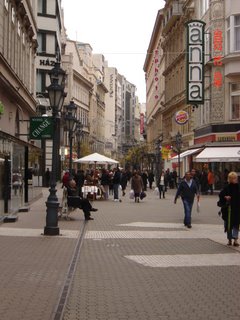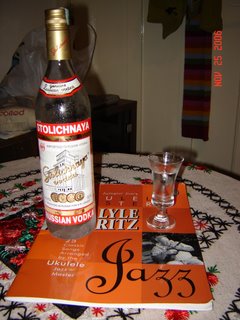
 We just got back from Budapest. I was impressed. This is a whole other part of Europe, as different from the western reaches of Paris and London as New England is from the Great Plains. It's a strangely depressing yet vibrantly curious place. Downtown is still riddled with fifty year old bullet holes and everyone is on the make. This is a city of contrast. A medieval castle shadowed by modern condos and world banks on one side and crumbling commie bloc apartments on the other. People in Prada evening wear mixed in with bent and worn "proletariat" still wearing their communist party pins. The national dish is gulyas,
We just got back from Budapest. I was impressed. This is a whole other part of Europe, as different from the western reaches of Paris and London as New England is from the Great Plains. It's a strangely depressing yet vibrantly curious place. Downtown is still riddled with fifty year old bullet holes and everyone is on the make. This is a city of contrast. A medieval castle shadowed by modern condos and world banks on one side and crumbling commie bloc apartments on the other. People in Prada evening wear mixed in with bent and worn "proletariat" still wearing their communist party pins. The national dish is gulyas, a thin stew made with beef joint, potatoes and cabbage in paprika broth. Very unlike the Americanized goulash at the corner diner. There’s another version (halaszle) made with Danube carp which they sell live from tanks in the grocery stores. The local wine is called “Bulls Blood” and it flows freely. The city’s great monument plaza, Heroes’ Square, shouts out hope for the future by
a thin stew made with beef joint, potatoes and cabbage in paprika broth. Very unlike the Americanized goulash at the corner diner. There’s another version (halaszle) made with Danube carp which they sell live from tanks in the grocery stores. The local wine is called “Bulls Blood” and it flows freely. The city’s great monument plaza, Heroes’ Square, shouts out hope for the future by lauding a politically complex past while tattooed and pierced skate punks vie with the pigeons for roosting rights beneath huge Huns on horses. Like Dorothy said, “This ain't Kansas,” but this whole area seems to be what Kansas might have become if Attila, Stalin and Hitler had their way in heartland USA
lauding a politically complex past while tattooed and pierced skate punks vie with the pigeons for roosting rights beneath huge Huns on horses. Like Dorothy said, “This ain't Kansas,” but this whole area seems to be what Kansas might have become if Attila, Stalin and Hitler had their way in heartland USA
 .
.

We enjoyed a misty day in the jewel of the Danube. As tourists we had a great time and wondered what an elongated working visit might be like. Budapest seems to have its welcome mat out – or, at least the people don’t mind a few visitors meandering about while they take care of their daily business. It’s fairly easy to get around using the very efficient public transit system. Although it helped having brother Kurt as a guide and interpreter, there seemed to be no real problem with the language. Because Magyar is such an obscure language (with no Indo-European roots/cognates) most people are fairly well versed in English and especially have a lot of German (unlike France or the US where so many feel you should know the language or leave). They seemed as fascinated with us as we were with them. On more than one occasion we bumped into friendly folks who were happy to try out their English on us. At one point, Kurt was engaged with a young man who uttered in broken English, “I am soldier . . .” and Kurt uttered his response in equally broken Magyar. They helped each other communicate for several train stops and left with the promise to speak again. I was especially charmed by the beautifully broken English of a young country girl selling her freshly dug truffles at the central market. “So, they haff no truffels in Amerika? Is so too bad, no? You buy from me?”
 The “fun-with-language” feel in Budapest made negotiating the city and doing business in its many restaurants and cafes much easier than trying to get a recalcitrant French barmaid to cooperate in a mutually advantageous transaction. Unlike other major Euro cities we visited, Budapest seems to have far fewer “tourist trap” businesses. Even in the major shopping districts there is a feel of business as usual rather than the "Grandpa went to Budapest and all got was this lousy T shirt" fleff. This is one of the city’s most endearing qualities: The tacit invitation to join the fray and rub shoulders with the locals.
The “fun-with-language” feel in Budapest made negotiating the city and doing business in its many restaurants and cafes much easier than trying to get a recalcitrant French barmaid to cooperate in a mutually advantageous transaction. Unlike other major Euro cities we visited, Budapest seems to have far fewer “tourist trap” businesses. Even in the major shopping districts there is a feel of business as usual rather than the "Grandpa went to Budapest and all got was this lousy T shirt" fleff. This is one of the city’s most endearing qualities: The tacit invitation to join the fray and rub shoulders with the locals.


Not that that there isn’t anything for the tourist, it’s just that Budapest offers up an intellectually more substantial fare. The historical stuff is marvelous. Budapest is a strategically well-placed area that has been fought over for so many centuries that it has had a hard time discovering (and maintaining) its own political and economic persona on a world scale. Just about the time the Magyars gained some security and balance, another "hoard" came over the horizon or up the river to re-configure the place in their own political likeness. From the Romans to Attila, to St Stephen’s christianity, to the Turks and various royalties, to the 1848 revolutions, the Nazis, Stalin (whose pewter bust, along with Lenin's adorns the shelves of every junk shop in
town) and the current geo-economic forces of the EU, this place has never had enough time to actually establish its own nationalistic equilibrium. It seems that the geographical Mittle European identity holds more sway than the singular Hungarian nationalistic identity – and that’s a shame. And NOW, from what I saw, there is a new invasion in the form of western capitalist "investments" and a global economy that threatens to undermine any real sense of a local economy. City center is web of global franchise -- Prada, Louis Vitton, Gap, MacDonald’s, Pizza Hut and the ubiquitous and varied international mobile phone dealerships. At first glance, you could be in any large Euro-city (or Manhattan). The global franchise movement has done its best business in former communist areas where westernization and fashion combine to offer a superficial status that obscures the ideological pieties necessary to nationalistic identity. The great contrast in “new capitalist” cities like Budapest can be seen in the difference between their many sober, patina green marble monuments to historical greatness and the glittering glass and neon monuments to the new global economy found in every city’s center.
dealerships. At first glance, you could be in any large Euro-city (or Manhattan). The global franchise movement has done its best business in former communist areas where westernization and fashion combine to offer a superficial status that obscures the ideological pieties necessary to nationalistic identity. The great contrast in “new capitalist” cities like Budapest can be seen in the difference between their many sober, patina green marble monuments to historical greatness and the glittering glass and neon monuments to the new global economy found in every city’s center.




Yet, through all this economic change the people of Budapest trundle along through history like the rest of us, taking it all in stride.

In Budapest we met an urban population still buying their daily bread from  the babushkas at the city markets where you can buy a loaf of rough rye, a bag of chicken heads, sheep necks, and tripe along with foraged wild mushrooms and locally netted carp, pike, and catfish from the Danube and Lake Balaton. One of the most curious sights of our whole trip was watching a young woman in a Prada coat and designer boots buying a bag of chicken heads from a local butcher shop. It's a heady mix: some people eat the sturgeon, others eat the caviar -- but it all comes from the same river. . . .
the babushkas at the city markets where you can buy a loaf of rough rye, a bag of chicken heads, sheep necks, and tripe along with foraged wild mushrooms and locally netted carp, pike, and catfish from the Danube and Lake Balaton. One of the most curious sights of our whole trip was watching a young woman in a Prada coat and designer boots buying a bag of chicken heads from a local butcher shop. It's a heady mix: some people eat the sturgeon, others eat the caviar -- but it all comes from the same river. . . .


Cheers,
Dennis

 We just got back from
We just got back from  a thin stew made with beef joint, potatoes and cabbage in paprika broth. Very unlike the Americanized goulash at the corner diner. There’s another version (halaszle) made with
a thin stew made with beef joint, potatoes and cabbage in paprika broth. Very unlike the Americanized goulash at the corner diner. There’s another version (halaszle) made with  lauding a politically complex past while tattooed and pierced skate punks vie with the pigeons for roosting rights beneath huge Huns on horses. Like Dorothy said, “This ain't
lauding a politically complex past while tattooed and pierced skate punks vie with the pigeons for roosting rights beneath huge Huns on horses. Like Dorothy said, “This ain't 
 .
. 
 The “fun-with-language” feel in
The “fun-with-language” feel in 
 dealerships. At first glance, you could be in any large Euro-city (or
dealerships. At first glance, you could be in any large Euro-city (or 



 the babushkas at the city markets where you can buy a loaf of rough rye, a bag of chicken heads, sheep necks, and tripe along with foraged wild mushrooms and locally netted carp, pike, and catfish from the Danube and
the babushkas at the city markets where you can buy a loaf of rough rye, a bag of chicken heads, sheep necks, and tripe along with foraged wild mushrooms and locally netted carp, pike, and catfish from the Danube and 





3 Comments:
I accept the Nobel with humility and a side of gulyas. History and local kultur was great, but the Stoli and Jazz pic pretty much says it all re the next trip over. I was just listening to Ludovic Beier and Angelo deBarre doing a gypsy accordion version of "Somewhere My Love" this morning and I could taste the Danube mist in the air. Ugh! That's what the vodka's for . . .
Thanks for the great tour of your city
Djennis
By Unknown, at 4:55 AM
Unknown, at 4:55 AM
Ah, the Budapest report. I am glad you put one together. You've got a flare for putting your travels into words - I kinda feel like I've been there, at least from the perspective of sights and smells. It's hard to believe that the Danube is still the source of all that fish! Didn't know that you had developed a taste for carp.
Good luck wrapping it all up this week. And safe travels.
Fred.
By Fred, at 6:56 AM
Fred, at 6:56 AM
This comment has been removed by a blog administrator.
By Fred, at 6:57 AM
Fred, at 6:57 AM
Post a Comment
<< Home